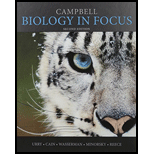
Campbell Biology in Focus; Modified Mastering Biology with Pearson eText -- ValuePack Access Card -- for Campbell Biology in Focus (2nd Edition)
2nd Edition
ISBN: 9780134433776
Author: Lisa A. Urry, Michael L. Cain, Steven A. Wasserman
Publisher: PEARSON
expand_more
expand_more
format_list_bulleted
Concept explainers
Question
Chapter 2, Problem 6TYU
Summary Introduction
Introduction:
Sulphur is a non-metal that belongs to p-block elements. Its atomic number is 16 and abbreviated as S. The valency of this element is 2 and its electronic configuration can be written as
Expert Solution & Answer
Want to see the full answer?
Check out a sample textbook solution
Students have asked these similar questions
please draw in what the steps are given.
Thank you!
please draw in and fill out the empty slots from image below.
thank you!
There is a species of eagle, which lives in a tropical forest in Brazil. The alula pattern of its wings is determined by a single autosomal gene with four alleles that exhibit an unknown hierarchy of dominance. Genetic testing shows that individuals 1-1, 11-4, 11-7, III-1, and III-4 are each homozygous.
How many possible genotypes among checkered eagles in the population?
Chapter 2 Solutions
Campbell Biology in Focus; Modified Mastering Biology with Pearson eText -- ValuePack Access Card -- for Campbell Biology in Focus (2nd Edition)
Ch. 2.1 - Is a trace element an essenteal element? Explain.Ch. 2.1 - Prob. 2CCCh. 2.2 - A nitrogen atom has 7 protons and the most common...Ch. 2.2 - Prob. 2CCCh. 2.2 - Prob. 3CCCh. 2.3 - Why does the structure HCCH fail to make sense...Ch. 2.3 - What holds the atoms together in a crystal of...Ch. 2.3 - If you were a phamaceutical researcher, why would...Ch. 2.4 - Which type of chemical reaction occurs faster at...Ch. 2.4 - Write an equation that uses the products of...
Ch. 2.5 - Prob. 1CCCh. 2.5 - How can the freezing of water crack boulders?Ch. 2.5 - Compared with a basic solution at pH 9, the same...Ch. 2.5 - What would be the effect on the properties of the...Ch. 2.5 - Prob. 5CCCh. 2 - The reactivity of an atom arises from A. the...Ch. 2 - Which of the following statements correctly...Ch. 2 - Many mammals control their body temperature by...Ch. 2 - We can be sure that a mole of table sugar and a...Ch. 2 - Measurements show that the pH of a particular lake...Ch. 2 - Prob. 6TYUCh. 2 - What coefficients must be placed in the following...Ch. 2 - A Slice of pizza has 500 kcal. If we could burn...Ch. 2 - Draw the hydration shells that from around a...Ch. 2 - What do climate change (see Concept 1.1) and ocean...Ch. 2 - SCIENTIFIC INQUIRY Female luna moths (Actias luna)...Ch. 2 - FOCUS ON EVOLUTION The percentage of naturally...Ch. 2 - FOCUS ON ORGANIZATION Several emergent properties...Ch. 2 - SYNTHESIZE YOUR KNOWLEDGE How do cats drink?...
Knowledge Booster
Learn more about
Need a deep-dive on the concept behind this application? Look no further. Learn more about this topic, biology and related others by exploring similar questions and additional content below.Similar questions
- students in a science class investiged the conditions under which corn seeds would germinate most successfully. BAsed on the results which of these factors appears most important for successful corn seed germination.arrow_forwardI want to write the given physician orders in the kardex formarrow_forwardAmino Acid Coclow TABle 3' Gly Phe Leu (G) (F) (L) 3- Val (V) Arg (R) Ser (S) Ala (A) Lys (K) CAG G Glu Asp (E) (D) Ser (S) CCCAGUCAGUCAGUCAG 0204 C U A G C Asn (N) G 4 A AGU C GU (5) AC C UGA A G5 C CUGACUGACUGACUGAC Thr (T) Met (M) lle £€ (1) U 4 G Tyr Σε (Y) U Cys (C) C A G Trp (W) 3' U C A Leu בוט His Pro (P) ££ (H) Gin (Q) Arg 흐름 (R) (L) Start Stop 8. Transcription and Translation Practice: (Video 10-1 and 10-2) A. Below is the sense strand of a DNA gene. Using the sense strand, create the antisense DNA strand and label the 5' and 3' ends. B. Use the antisense strand that you create in part A as a template to create the mRNA transcript of the gene and label the 5' and 3' ends. C. Translate the mRNA you produced in part B into the polypeptide sequence making sure to follow all the rules of translation. 5'-AGCATGACTAATAGTTGTTGAGCTGTC-3' (sense strand) 4arrow_forward
- What is the structure and function of Eukaryotic cells, including their organelles? How are Eukaryotic cells different than Prokaryotic cells, in terms of evolution which form of the cell might have came first? How do Eukaryotic cells become malignant (cancerous)?arrow_forwardWhat are the roles of DNA and proteins inside of the cell? What are the building blocks or molecular components of the DNA and proteins? How are proteins produced within the cell? What connection is there between DNA, proteins, and the cell cycle? What is the relationship between DNA, proteins, and Cancer?arrow_forwardWhy cells go through various types of cell division and how eukaryotic cells control cell growth through the cell cycle control system?arrow_forward
arrow_back_ios
SEE MORE QUESTIONS
arrow_forward_ios
Recommended textbooks for you
 Concepts of BiologyBiologyISBN:9781938168116Author:Samantha Fowler, Rebecca Roush, James WisePublisher:OpenStax College
Concepts of BiologyBiologyISBN:9781938168116Author:Samantha Fowler, Rebecca Roush, James WisePublisher:OpenStax College

Concepts of Biology
Biology
ISBN:9781938168116
Author:Samantha Fowler, Rebecca Roush, James Wise
Publisher:OpenStax College




